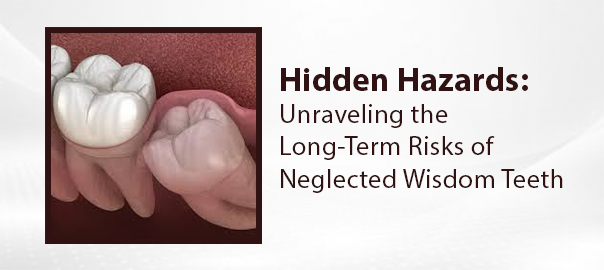
Hidden Hazards: Unraveling the Long-Term Risks of Neglected Wisdom Teeth
Introduction
When the third set of molars fail to emerge completely, they are termed as Impacted Wisdom Teeth. When left untreated, impacted teeth can lead to a number of oral health complications.
Chronic Pain and Discomfort
Impacted wisdom teeth frequently result in:
• Persistent jaw pain
• Difficulty in mastication
• Swelling and tenderness in the back region of oral cavity
With time, these symptoms may worsen and majorly influence the quality of daily life.
Increased Risk of Infection
Impacted wisdom teeth creates the perfect environment for bacterial growth, leading to:
• Pericoronitis: Gum tissue inflammation around the tooth
• Abscess formation
• Systemic infections in severe cases
Structural Damage to Adjacent Teeth
The improper positioning of impacted wisdom teeth can exert pressure on neighboring molars, resulting in:
• Misalignment of adjacent teeth
• Increased susceptibility to decay in hard-to-reach areas
• Root resorption of second molars in extreme cases
Orthodontic Complications
Impacted wisdom teeth may compromise previous orthodontic work by:
• Causing crowding of anterior teeth
• Altering bite alignment
• Necessitating additional orthodontic intervention
Cyst and Tumor Formation
In rare instances, untreated impacted wisdom teeth can lead to the development of:
• Dentigerous cysts
• Odontogenic tumors
These pathological entities may cause extensive bone resorption and require complex surgical management.
Not all impacted wisdom teeth require immediate extraction, but they do need regular monitoring. This allows for timely intervention to prevent potential long term complications. An oral surgeon will help you in determining the most appropriate course of action. The final decision also takes into consideration individual anatomic considerations and risk factors. Proactive management of an impacted tooth contributes significantly to maintaining long term oral health and overall well-being.
Leave a Reply
Leave a Reply
Explore More Similar Posts
Explore More Blogs


Leave a Reply